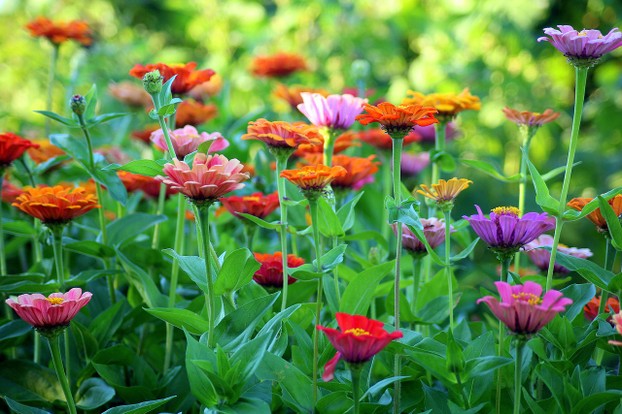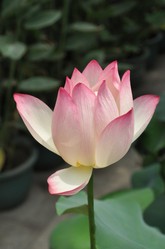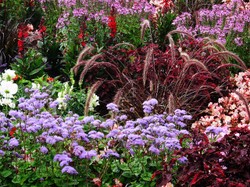The recent issue of The Horticulturalist, the journal of the Chartered Institute of Horticulture, waxed eloquently on the festivals and flower shows that are highlighting the benefits of gardening for mental and physical health. One quite surprising idea was that manual work is important for the . the lymph system, which is vital for waste clearance. This system has no pumping mechanism of its own, so upper body movement functions as a power source for lymph. Gardening is a gentle way of getting the exercise needed.This adds to the well-known physical benefits of gardening as a form of gentle, sustained exercise ideal for older people, though for younger ones as well.
In his presidential editorial Dr Owen Doyle addressed the human need for exposure to germs and pointed out that without exposure to germs in the natural environment immunity does not develop, and that children need to be exposed from early on in life. This point is made by Robin Jacobs, writing in the online article The Health Benefits of Gardening, who states that exposure to the beneficial microbe Mycobacterium vaccae found in soil generates resistance to psoriasis, allergies and asthma, the latter being a disease of modern societies. This bacterium, she states, may well be a counter to depression, which arises from physical conditions in the brain.Some of her points are reinforced by Doctor Doyle, who suggests that blood cancer [acute lymphoblastic leukaemia]] in children is becoming increasingly known, and he believes that modern sanitised lifestyles are to blame,a point that can also be made about asthma. Dr Doyle believes that exposure to gardens would be a therapeutic aid that might obviate the increasing prevalence of this and certain other kinds of cancer. He cites Professor Mel Greaves, who believes that the human immune system may become susceptible to cancer if it does not encounter enough bugs in early life. Gardening, Doyle believes, is an ideal way to encounter the bugs that we need.But so, says Dr Doyle, is outdoor play, which should be encouraged.
Speaking for myself, I am completely allergy-free, and this benison cannot have been hindered by the fact that from early years I played in parks several days a week and later, when we got a garden I played in it very often. My first gardening experience was at the age of five, helping my father to plant flowers. Lots of bugs,mucky hands, and no allergies! Nor have I ever had asthma.








 Darkness over the Earth the skies darkened when Jesus was crucified12 days ago
Darkness over the Earth the skies darkened when Jesus was crucified12 days ago
 TheThousand Year Gardenon 11/26/2025
TheThousand Year Gardenon 11/26/2025
 Women of the Gospelson 10/11/2025
Women of the Gospelson 10/11/2025
 Religious Gardenson 08/25/2025
Religious Gardenson 08/25/2025



Comments
Yes. An Abbey is a monastery ruled by an abbot, as opposed to a priory, which is ruled by a prior, a monk of rank inferior to an abbot. Contents are run on the same set of rules as monasteries, but they are only form women.
Thank you!
Your comment below, in answer to my previous question, describes monasteries as displaying soul-calming gardens.
May the same be said of convents and abbeys?
Yes. Monasteries had gardens designed to calm the soul.
The first paragraph to the first subheading, Allergies, immunity and the garden, advises us that "The recent issue of The Horticulturalist, the journal of the Chartered Institute of Horticulture, waxed eloquently on the festivals and flower shows that are highlighting the benefits of gardening for mental and physical health."
Might there be similar concerns for emotional and spiritual health?
We have a small green bin which is for compostibles. It is collected weekly.
A council compost collection is a great idea even as I find no such equivalent among us west-ponders apart recyclable pick-ups with garbage.
Recyclables must be clean of any residue and clear of any labels.
What would you have to do -- bag it? box it? -- to make sure that the back-yard compost gets picked up?
Her flower plot is in our back yard. We have a council compost collection with the garbage.
The very last sentence, "And maybe not even with tools, for last night I dead-headed my wife's flowers when I went out to check on them."
Your wife's spent flowers must be in a front- or back-yard plot smaller than your allotment, correct? So perhaps Maureen needs no extensive disposal area. Would flowers dead-headed (by her, by you) go among mown-grass clippings or in the trash or into a compost pit or onto a compost pile?
I have heard of grounding. I don't do it, but I I garden bare handed. You expressed a hope for my health. The disease that I have is incurable, so I will not get better. Medicine can hold it back. The doctor said that the aim of medical treatment is to make me as comfortable as possible. But I should live a normal lifespan.
Have you heard of "grounding" where you walk barefoot on the earth to absorb good energy? Well, gardening without gloves must be similar, when your hands are playing in the dirt and connecting with nature. I haven't been gardening much in this hot and humid Florida climate, but lately I've started turning my small yard into a "food forest". It's slow going, but I love to get outside each day and see what new things are growing. Overall health seems to come from a wide variety of things, and being in a garden has to be at top of the list important (maybe right behind eating well!). I hope you are doing better Frank.